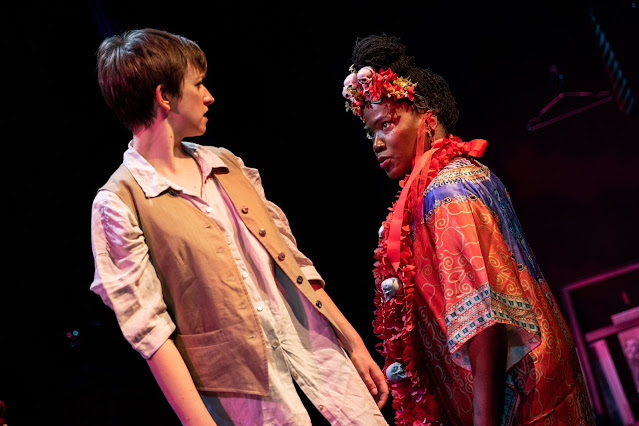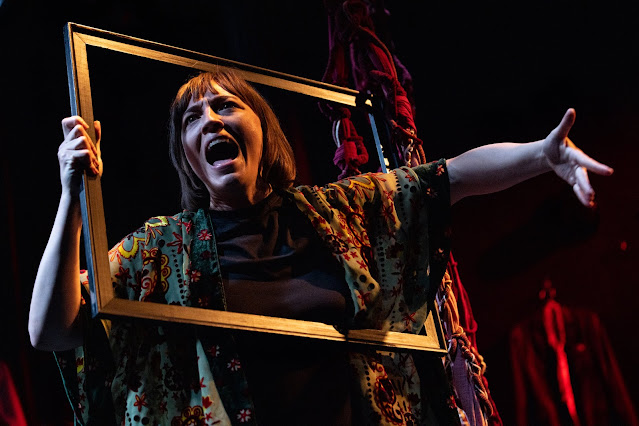Misconceptions
Written by Steve Wangh
Directed by Jessica Burr
Presented by Blessed Unrest at 122CC Theater
150 1st Avenue, 2nd floor, Manhattan, NYC
May 11-June 3, 2023
 |
L to R: HiIary Dennis and Cellia Pitt. Photo by Maria Baranova |
Reproductive choices are almost necessarily fraught, especially in a society in which, as scholar Lee Edelman argues, the figural Child functions as a fundamental part of heteronormative hegemony. Misconceptions, the new production from Blessed Unrest, examines one such choice, whether or not to continue to terminate a pregnancy, through a combination of a fictional narrative and the words of real-world women and media figures. From NYC-born playwright Steve Wangh, no stranger in his long career to politically charged topics, Misconceptions finds the humanity and even humor in terrain that, in the United States, has not only been politically weaponized over decades but has also recently seen the dangerous, sometimes literally fatal, obliteration of women's rights.  |
| Julie Becker. Photo by Maria Baranova |
When the play begins, performance artist Harriet (Hilary Dennis) is having a breakout career moment. As recognition and opportunity come her way, so does the discovery that she has unintentionally become pregnant, the result of a nostalgic quickie with her ex Jorge (Sean Mana), father to the five year-old daughter, voiced at points by Ethelyn Friend–who also plays Harriet's mother–but suggested rather than seen onstage. Harriet is already raising this child on her own, and that she is sometimes addressed by her nickname, Harry, perhaps gestures towards this self-sufficiency. Jorge did not prove himself the best partner the first time around, and he and Harriet now live in different parts of the country, but Harriet is still conflicted about the decision which she faces, even if Jorge is not the foremost reason why. Harriet begins work on a new artistic project, about abortion, as a way for her to work through her own decision and her feelings about it, helpfully informing the audience at one point that she herself is fictional construction, while the words of her interview subjects and of most of the cultural and media personalities that the show presents as she assembles his fictional artistic project are entirely real.
 |
| Celli Pitt. Photo by Maria Baranova |
Within this bricolage of voices are one woman who focuses more on her partner's reaction and another who works at a Christian pregnancy center after a medical abortion (Julie Becker plays these various interviewees). The conflictedness that Harriet feels becomes almost a motif, though to different degrees, for different reasons, and in relation to different aspects of women's experiences and choices. (One niggle is that it would have been nice to have a voice clearly representing those for whom the choice is not difficult to make or something that they second guess.) We hear voices as well from Fox News, CNN, Catholic pro-choice activism (Becker again, as Frances Kissling), and even Jorge's male friends, in a scene in which three women translate three men's Spanish as they speak, creating an interesting dynamic around the idea of voice. A Muslim butcher, Alim (Perri Yaniv), recruited by Harriet's close friend Darcelle (Celli Pitt) for Harriet's art performances, introduces the idea that sacrificing life (in his case, of actual sentient beings) can be holy work.
 |
| L to R: Rich Brown, Hilary Dennis, and Perri Yaniv. Photo by Maria Baranova |
The resonance of this idea with a story of a woman who killed one of her children as an act of love during war represents just one of the many interconnections and echoes in this densely woven play, with the art piece that gains Harriet recognition about children in wartime. Such elements situate the issue of reproductive choice in larger contexts, the largest of which perhaps arrives with Kali (Celli Pitt, in an interesting doubling, as both Kali and Darcelle critique, on different grounds, Harriet's self-questioning), goddess of both creation and destruction, and her view of women's burdensome power. The staging is engagingly inventive throughout. Harriet toys with ropes reminiscent of umbilical cords, which at one point resemble a maypole without the (phallic) pole, empty picture frames through which actors speak suggest screens, and costume changes eventually and notably leave one wall adorned with a number of bare coathangers. The production makes excellent use of the physical space, including taking advantage of the three-sided arrangement of the seats to have actors deliver lines to individual audience members while moving through the performance area, making them confidantes to Harriet or Darcelle. As these two friends, Dennis and Pitt impressively anchor a terrific cast who deftly inhabit the play's kaleidoscope of characters. Amidst the play's postmodern elements, the central relationships–Harriet and Darcelle, Harriet and Jorge, Harriet and her mother–never feel less than grounded and authentic.
Misconceptions offers an abundance of reasons to take a page from Harriet's interviewing playbook and go let the show speak for itself.
-John R. Ziegler and Leah Richards







Comments
Post a Comment